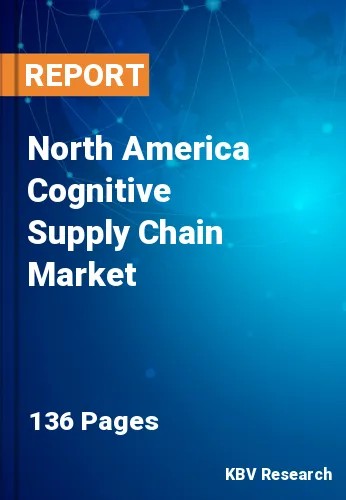The North America Cognitive Supply Chain Market would witness market growth of 14.0% CAGR during the forecast period (2023-2030).
The market has the potential for substantial expansion due to technological advances and changing business requirements. Due to the accelerated development of AI technologies such as machine learning and natural language processing, supply chain systems have become more complicated and data-centric. This allows businesses to utilize predictive analytics and demand forecasting to optimize inventory management and maintain a seamless supply chain. In addition, incorporating Big Data and Internet of Things (IoT) devices into supply chain operations has produced enormous amounts of data. Cognitive technology can process and analyse this data in real-time, yielding valuable insights that improve decision-making and operational effectiveness.
These solutions have been widely adopted due to the rise of customer-centricity as a fundamental business strategy. Businesses seek to provide a superior customer experience by optimizing processes and reducing lead times. Cognitive technologies aid in achieving this by optimizing operations, ensuring products reach consumers promptly, and enhancing the overall responsiveness of the supply chain. Cost optimization continues to play a significant role in propelling the expansion of this market. Businesses can realize substantial cost savings by minimizing inventory holding costs, lowering transportation costs, and improving overall supply chain efficiency.
North America has a well-developed technological infrastructure, including robust internet connectivity, cloud computing resources, and data centres. This infrastructure provides a solid foundation for implementing cognitive supply chain technologies that rely on data analytics and real-time processing. Many companies in North America are aware of the benefits of these technologies, such as AI, machine learning, and analytics, in enhancing supply, reducing costs, chain efficiency, and enhancing customer satisfaction. This awareness has led to a high demand for such solutions. North American businesses face strong competition both domestically and globally. In order to remain competitive, businesses are increasingly turning to cognitive technologies to gain an edge in supply chain operations, reduce lead times, and meet customer expectations.
The US market dominated the North America Cognitive Supply Chain Market, By Country in 2022, and would continue to be a dominant market till 2030; thereby, achieving a market value of $4,995.5 million by 2030. The Canada market is experiencing a CAGR of 16.6% during (2023 - 2030). Additionally, The Mexico market would exhibit a CAGR of 15.6% during (2023 - 2030).
Based on Deployment Type, the market is segmented into On-premise, and Cloud. Based on Technology, the market is segmented into Internet of Things (IoT), Machine Learning, and Others. Based on Enterprise Size, the market is segmented into Large Enterprises, Small & Medium-sized Enterprises. Based on Vertical, the market is segmented into Manufacturing, Food & Beverage, Logistics & Transportation, Retail & E-commerce, Healthcare, and Others. Based on countries, the market is segmented into U.S., Mexico, Canada, and Rest of North America.
Free Valuable Insights: The Cognitive Supply Chain Market is Predict to reach $20.7 Billion by 2030, at a CAGR of 14.8%
The market research report covers the analysis of key stake holders of the market. Key companies profiled in the report include SAP SE, Oracle Corporation, Accenture PLC, IBM Corporation, Intel Corporation, NVIDIA Corporation, Honeywell International, Inc., C.H. Robinson Worldwide, Inc., Amazon.com, Inc. and Panasonic Holdings Corporation
By Deployment Type
By Technology
By Enterprise Size
By Vertical
By Country
Our team of dedicated experts can provide you with attractive expansion opportunities for your business.

